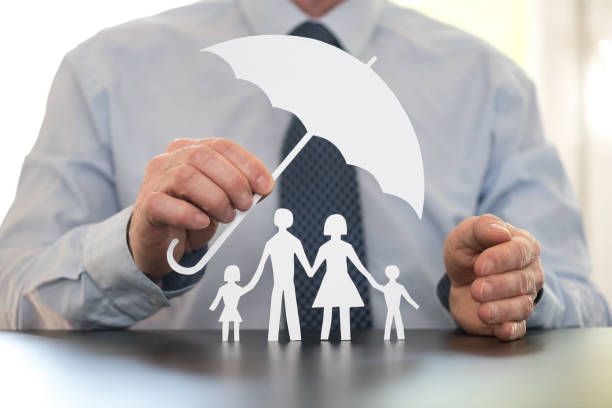Top 5 Reasons Why You Should Have Life Insurance

Symbol of family protection by a general agent
Over 40 million people in the US alone admit they need life insurance but choose not to get it. There are many reasons why people decide not to get life insurance, with one of the reasons being the fear that they can’t afford it.
What is life insurance? It’s a contract between you and your insurance provider. In essence, you pay a premium every month, and your insurance company agrees to pay out a lump sum payment to your loved ones after you die.
Life insurance is meant to help your beneficiaries recover financially after you pass away. The money can be used for anything, including paying for your funeral and paying off what you owe on your car, home, credit card, and student loans.
There are also many different types of life insurance to choose from, including permanent life insurance and term life insurance. Permanent life insurance will provide you with coverage throughout your life.
It tends to accrue monetary value over time and will also last for your entire lifespan in many cases: Due to these benefits, permanent life insurance tends to cost more than term life insurance.
Term life insurance is more affordable than permanent life insurance, which may partially explain why it is the most popular type of life insurance. Term life insurance will provide coverage for X amount of time. Term life insurance can be valuable if you know you will need financial protection in the near future and don’t want to pay an expensive premium each year.
Moreover, the premiums that you pay monthly will remain constant throughout the entirety of your life insurance policy. The duration of the policy can range anywhere from 10 to 30 years. Here, we will focus on the five reasons why you should have life insurance.
Why Life Insurance is Important
It can be used to pay off debts. Your life insurance benefits can be used to pay off some of the debts that you have left behind. It is designed to help ease the financial burden that your family has to deal with after you have died.
For example, the money can be used to pay off student, credit card, home, and automobile debts. It can also give loved ones a future. The financial future of your loved ones will be protected after you are gone.
The money that is provided may help keep your family afloat for years or even decades, in some cases. In addition, life insurance will also provide extra support during retirement. Whole life and permanent life insurance will last until you pass away.
They also incorporate a savings component that is known as cash value. You will be able to withdraw this cash value in order to boost your income during retirement. The cash value can even be taken out as a loan if you require long-term care services during your twilight years.
As can be seen, life insurance also provides benefits while you are still alive. Another benefit of life insurance is that it allows you to prepare for end-of-life expenses. Once you have passed, your family will need to deal with multiple costs.
From the headstone/urn and burial/cremation costs to the actual funeral service, the expenditures for a funeral can exceed $10,000.
Life insurance will ensure that such costs will be taken care of so that your family can focus on processing their grief instead of your funerary costs. Life insurance also helps people prepare for the unexpected.
Life insurance helps you prepare for the inevitable by providing your family with a financial plan. Your age and health may also impact how much your premiums are, so getting life insurance when you are still young and healthy will lower your premiums drastically.
You may not qualify for life insurance if you apply after having suffered a serious accident or after you have been diagnosed with a serious illness.
What are the different types of life insurance?
Term life insurance is suitable for most people. It will last for a certain number of years, per your policy. As such, if you do not pass away within the policy’s designated timeframe, then your family will not receive any money.
Term life insurance is the cheapest type of life insurance and is also the most popular. It provides sufficient coverage for most recipients.
Universal life insurance provides a death benefit that is guaranteed. Your premiums will also not change. However, the monetary value of the policy is next to nothing.
While universal life insurance is more affordable than other forms of life insurance, missing a single payment may force you to forfeit your entire life insurance policy.
Participating life insurance usually provides both a cash accumulation component and an insurance component. You will be provided with adequate coverage for life, provided you make all of your premium payments.
As a policyholder, life insurance allows you to benefit from the profitability of your insurance provider. De facto, you will be paid annual dividends. As can be seen, there are multiple types of insurance to choose from.
What kind of insurance is best?
Whole life insurance allows you to be covered even if you pay off your premiums earlier than expected. As for term insurance, your coverage will cease as soon as you stop making payments.
It’s also possible to cash out a whole life insurance policy, something that’s not possible with a term insurance policy. The best type of insurance will depend on your unique needs and goals.
For example, do you ave mounting debts? Do you have dependents that will need to be taken care of when you pass? Speak to an advisor to have them review your lifestyle and finances.
They will help you choose a life insurance policy that will protect you and your loved ones.
Protect What Matters Most
For you and your loved ones, taking out a life insurance policy is strongly recommended for peace of mind and guaranteed financial security.
Please speak to an advisor to determine the type of life insurance policy you need in order to meet all of your short-term and long-term financial goals.







